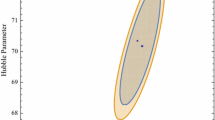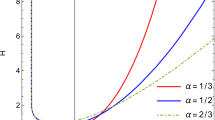Abstract
In a two-component Universe which consists of fluid (visible matter) plus collisinless massive neutrino gas (dark matter), the remarkable difference between the developed inhomogeneities in two components could be formed after the decoupling time. Whether the initial perturbation was in which of the two components, the inhomogeneities developed in visible matter are larger than that in neutrinos, especially on smaller scales. The necessary condition for such a situation to arise is only that the density of neutrinos in the Universe is dominant. That means the non-dominant visible component in the Universe is strongly clustered especially on smaller scales, while the distribution of the dominant dark matter (neutrinos) is fairly uniform.
Similar content being viewed by others
References
Fang, L. Z.: 1984, in L. Z. Fang and R. Ruffini (eds.),Cosmology of the Early Universe, World Scientific, Singapore.
Fang, L. Z. and Liu, Y. Z.: 1981,Nuovo Cimento Letters 32, 129.
Fang, L. Z. and Sato, H.: 1982,Prog. Theor. Phys. 67, 1994.
Fang, L. Z., Li, S. X., and Xiang, S. P.: 1984,Astron. Astrophys. 140, 77.
Gilbert, I. H.: 1966,Astrophys. J. 144, 233.
Xiang, S. P.: 1985,Astrophys. Space Sci. 111, 171.
Author information
Authors and Affiliations
Rights and permissions
About this article
Cite this article
Shouping, X. Density perturbations in a Universe consisting of fluid plus collisionless neutrino gas. Astrophys Space Sci 112, 83–91 (1985). https://doi.org/10.1007/BF00668411
Received:
Issue Date:
DOI: https://doi.org/10.1007/BF00668411




